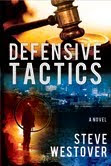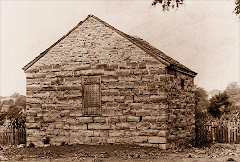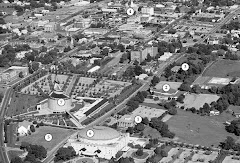
I have the opportunity to Interview Dan Harrington, author of a new book entitled, Who's At The Door: A Memoir of Me and the Missionaries. For members of the LDS church, this is a fascinating peek into the "Investigator" experience. I hope you enjoy the interview.
Me: Thank you for sharing some of the experiences you had with the missionaries. I must admit, I didn’t know what to expect when I opened the book but I was hooked immediately and I finished in one sitting. For me, that is a real accomplishment. A number of questions came to mind as I was reading and I love that I have the opportunity to ask the author about them. Thank you for taking the time to answer my questions.
Dan: Thank you for the interview. I've never read more than 50 or so pages in one sitting, so I'm honored you enjoyed my work that much.
Me: Who’s at the Door? is a personal account about your investigation into the Church of Jesus Christ of Latter-day Saints and your relationship with the full-time Mormon missionaries. Was it a challenge to share so much about your personal journey of faith with your friends and family, and even strangers who will read the book?
It was hard at times, but I only worried about it in retrospect, after I got the publishing deal. You hear so much about how hard it is to get a book published that I wasn't sure the manuscript would ever see print.
I didn't want to get my family's hopes up, so I didn't tell them about the book until I finished writing it. The missionaries were the only people who knew about the book from the beginning.
I remember sitting in a restaurant talking with Elders Luke and Allred and telling them I wanted to write a book about my experience. They were positive about it right away.
As a freelance writer, I know how challenging it can be to gain an editor's ear if you've never worked with them before. My biggest concern was that I'd spend endless hours on a story only for it to be banished to my sock drawer. ( A lot of things get lost in there. )
The experience itself was never secret. As my family and friends will attest, I talked about it often. Sometimes the reaction at the dinner table was, “Oh no, not another Mormon story. How many times do we have to talk about them? Let's watch the paint dry instead.” I was the only person I knew who found the LDS Church so fascinating.
It wasn't until a month or so before the book would be published that I worried about how strangers might react.
The challenge of writing a memoir is that you're recording intimate details and then saying, “Hey everyone, come read my private stuff!” I didn't think much about that when I was writing the book. I just wrote it because it was in my heart to do so.
Me: What kind of reaction has the book received from the missionaries and church members in your area?
Dan: So far, I haven't had one bad review. (Knock on wood) All my elders have been very pleased with it. I received a very nice e-mail from one of their mothers who thanked me for being a friend to her son, and that meant a lot to me.
One of the most surprising things about the experience was how much the missionaries trusted me to write a fair and balanced story. Sometimes I would read them parts of the book, and they always loved the humor in it, and they liked seeing themselves from my perspective. Elder P once told me, “This book will be awesome. It has everything Mormons like—the missionaries, the humor. It's great!” I'm hoping that's a prophecy of sorts.
I tried to make my home a haven for them. I just wanted to be the kind of person I'd hope to meet if I were the one on the mission.
Sometimes I joked that I was like their older brother, but I could never be their big brother because they were all bigger than me.
I've only heard from a handful of ward members, and they enjoyed the book also. I'm hoping they see the love and respect in it too.
I do know that at least one ward member researched who my publisher was because they were concerned about what I might say. Having an LDS publisher like Cedar Fort and Becky Thomas, a columnist from Mormon Times, put their stamps of approval on the book has been tremendous.
Me: What do you hope members of the church will gain by reading this book? What value does your book hold for “investigators”?
Dan: I want investigators to know that I've been where they are now, and I know how they feel. In fact, a lot of people do. Thousands of people meet with missionaries every day, but we rarely hear about it, and books about being an investigator don't usually invite the reader to make up their own mind.
I've read too many books and artcles that not only lead a horse to water, but hose it down, splash, and drench it. Readers are smart and can make up their own minds. They will anyway.
I think the book will also show investigators that they need to look into certain details for themselves because they're huge and important and can be skimmed over far too easily.
As for Church members, I want them to know what it's like to be an investigator and that it's possible to care about the LDS Church even if you're not a member.
Me: Have you continued to attend the local Ward and meet with the Missionaries since finishing the book?
Dan: No, but I met with several other missionaries who came after Elder P and Elder Bailey, the final companionship mentioned in the book. I even threw a surprise 21st birthday party for one of them, Elder Walker. His companion and I had it planned out where we would spray him with silly string as soon as he came through the door. It was fun, and I was glad to be part of their lives.
I ended the book where I did because it felt, from a storytelling standpoint, that it was time for a conclusion. In real life, however, I spent an additional 4 or 5 months with the Church.
Eventually, I made a prayerful decision not to attend the ward anymore. I spent more than a year going to the Church, and the elders even joked that I attended more often than some members.
Once I stopped attending the ward, some of the later missionaries not mentioned in the book chose not to visit me, and I think it was partially a personality thing. Not every elder enjoyed my company or saw my manuscript as a fascinating project. Imagine that.
Me: Would you identify yourself as a “seeker” for truth or a curious student?
Dan: A little of both, but calling myself a “seeker for truth” sounds a little pretentious. Religion has always fascinated me as a subject. However, I usually learned about other faiths from books. It's much more powerful to learn about it from the people who live it.
I've always been a curious person; it often goes hand-in-hand with the type of writing I do.
Me: As a church member, I found your account fascinating but at times painful. One of the painful moments came as you realized the missionaries had not told you “everything”. You felt that they were withholding vital information from you that could impact your decision to join the church. In this case, it was information about the temple. Do you consider this moment to be the pivotal point at which you cooled to the prospect of joining the church or was it merely another “red flag”?
At times, the experience was painful for me too. As a writer, I'm excited that the story helped you feel the same way I did and at the same moment. That's every author's dream, isn't it?
Learning more about the temple was a huge cooling point in the journey. As a student, it's intriguing, but to actually participate in temple work is obviously another ball park altogether.
Me: You later came to a realization that the missionaries couldn’t share everything at one time. It would be like trying to give you a sip of water from a fire hose. What bothered you most? Not being taught “every detail” or the perceived lack of trust by the missionaries? Did your relationship with the Elders fully recover from this broken trust?
Dan: What bothered me most was how things were being kept from me and that certain details were omitted, presumably for my own good. Not only that, but I learned that even if I got baptized, this would continue for some time.
Whenever I read something unsettling about the LDS Church, I would normally bring it to the elders and ask their opinion of it. Sometimes they had good answers, and sometimes they didn't. I'm just glad they were honest. That's all I wanted from them really: honesty.
We had many lengthy discussions that I couldn't put in the book. One thing I learned was how much the elders appreciated the sincerity behind my questions. They know when people are asking questions only to start an argument, and they knew I wasn't that type of person. They appreciated my willingness to listen to their side of the story.
I can't always make a wide-sweeping statement about my relationship with the elders because they're individuals. I have individual friendships with each of them. Naturally, some of these friendships are stronger than others. Generally speaking, I wouldn't say our relationship recovered. I would say it changed tremendously. It felt like a peek behind “the veil” of the missionary program, so to speak. While I care about each of them, I couldn't base a conversion on that.
Me: Beyond trite slogans of “Sacred, not secret”, can you understand why some information, such as specifics about temple worship, is reserved for church members who are prepared to receive it?
I understand the philosphy of it. I think I understand the concept as much as a nonmember could. However, just because someone is a church member, does that mean they are prepared to receive it, whatever “it” is? Who's to say what a believer is prepared to receive from the Lord? Only the Lord.
Me: Is it possible to make a leap of faith, knowing that there is information you don’t have?
Of course. I think even meeting with the elders was a leap of faith for me. Discussing a potentially explosive topic with guys who were twice my size required some faith, don't you think?
Me: You compliment the friendliness of the missionaries and members and you discuss that the people of the church, not the doctrine, most often convert “investigators”. Do you feel people should choose a place worship based on social considerations of friendliness, social comfort etc, or should it be based on the doctrines of the church?
Ideally, it needs to be a mix of both. I never went to church for fellowship in the past so seeing it in action in the LDS community was an incredible experience. You really get a sense that the people care about each other.
However, we also have to make sure that Church does not become a social club. I've always attended Church for what it teaches about God, and I believe that should be the primary consideration. To quote Joseph Smith “everything else is an appendage.”
Me: Do you believe it is possible for a “true church” to exist with the “fullness of the gospel of Jesus Christ”?
Yes.
Me: How would one identify the “true church”?
First of all, I want to be clear that when I talk about the book, I don't advise people about what church they should attend. Choosing a home church is a personal decision that should be left up to the individual. I'm a writer, not an apologist, counselor, or missionary.
With that said, I personally believe the most important thing is to recognize how significant Jesus is and what He's done for us. Too often, the world tries to depict him as a philosopher, teacher or simply a “good man.” He's is so much more than that. His place in your heart is far more important than which pew you sit in.
Me: I enjoyed your reflections on catechism from your youth and the lessons learned there. You also learned lessons from the missionaries and from other churches you visited. Are bits and pieces of the truth scattered across religion and denomination, or is there a one-stop-shop for absolute religious truth?
I think a lot of churches have some truth, but I really try to avoid making broad judgments. I don't presume to know the entire truth. I don't think it's humanly possible. I'm still learning like everyone else.
Me: The spiritual journey of growth is important and your book shares examples of some of this growth. What was the most significant change you experienced on your journey with the LDS missionaries?
Gee whiz..this is a hard question! The most signifcant change was how I went from knowing nothing about the LDS Church to being fairly knowledgable about it. I went from seeing the missionaries as “crazy religious people at the door” to hard-working young men with a firm dedication to faith.
I've become a magnet for people looking to share stories about a time they met missionaries, saw a Mormon commercial or want to know why Mormons can't sip a good cup of Folgers. For the record, I never liked coffee myself.
Me: Do you have any regrets?
I regret not living closer to Elder Dowling so he could teach me how to be more like Clint Eastwood.
Me: A journey is only positive if it takes us where we need to be. What do you expect to find at the end of your journey?
I think our walk with Christ doesn't end until the day we meet Him.
Me: Do you have plans for another book?
I do, but my ideas are all playing king of the mountain in my head right now. I'm freelance writer for several publications, so I have a lot to keep me busy until one idea battles to the top of the heap.
I think this book, in particular, grabs people because it is a true story.
Me: Thank you for being so kind and watching out for our missionaries.
Dan: It was my pleasure.
I really want to thank Dan for agreeing to do this interview. I was facinated with his book and I'm grateful for the opportunity to follow up with some questions I had while reading. I recognize my questions were very personal but I appreciate Dan's forthright answers.
I will be following up with my review of Dan's book, Who's at the Door? in early January. Stay tuned.
I would like to wish everyone a Merry Christmas! See you next year!
 Well, I feel the need to post one more blog update in 2010 so here you go.
Well, I feel the need to post one more blog update in 2010 so here you go.
























